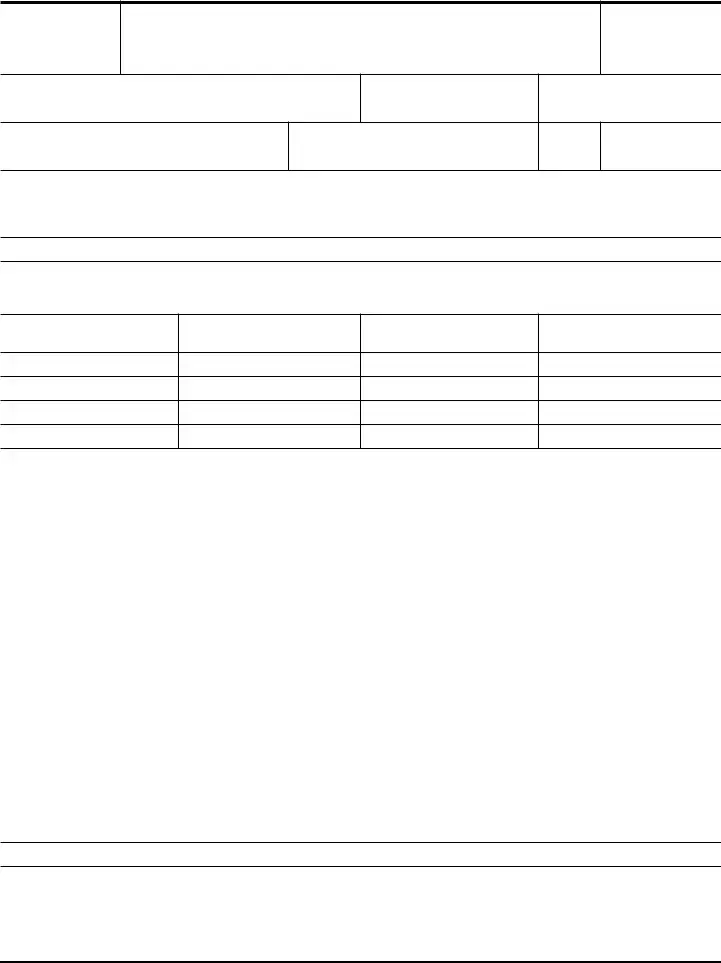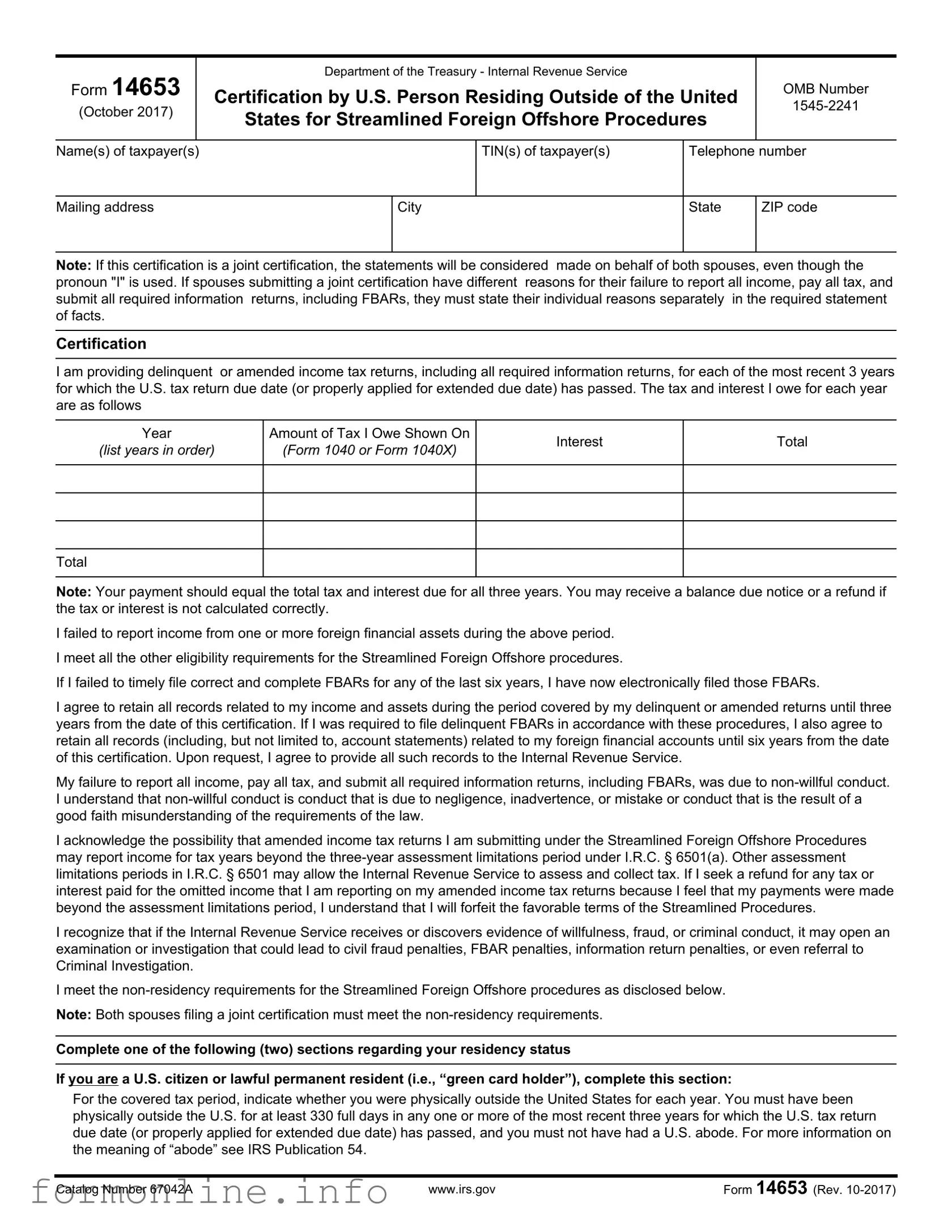Fill Out a Valid 14653 Form
The 14653 form, officially titled "Certification by U.S. Person Residing Outside of the United States for Streamlined Foreign Offshore Procedures," is a crucial document for U.S. citizens and residents living abroad who wish to rectify their tax filing status with the Internal Revenue Service (IRS). This form allows individuals to certify their eligibility for the Streamlined Foreign Offshore Procedures, a program designed to assist those who may have unintentionally failed to report foreign income or financial assets. Key components of the form include the requirement to provide delinquent or amended income tax returns for the past three years, a declaration of the tax and interest owed, and a statement explaining the reasons for the previous non-compliance. Additionally, the form necessitates that individuals affirm their non-willful conduct regarding their tax obligations, meaning that any failures were not intentional but rather due to negligence or misunderstanding. Furthermore, it emphasizes the importance of retaining relevant records for a specified period and outlines the residency requirements that must be met to qualify for the streamlined procedures. This certification process is essential for individuals seeking to come into compliance with U.S. tax laws while minimizing potential penalties.
Common mistakes
-
Incorrect Personal Information: Failing to provide accurate names, taxpayer identification numbers (TINs), or contact details can lead to processing delays.
-
Missing Signatures: Not signing the form or having both spouses sign a joint certification can result in rejection of the submission.
-
Incomplete Tax Information: Omitting any required tax amounts or interest owed for the past three years can cause issues with the IRS.
-
Failing to Attach Required Documents: Not including necessary computations or supporting documents, especially for non-residents, can make the submission incomplete.
-
Not Meeting Non-Residency Requirements: Failing to prove physical presence outside the U.S. for the required number of days can disqualify the application.
-
Inadequate Statement of Facts: Providing vague or insufficient explanations for failures to report income or file returns can lead to rejection.
-
Ignoring Joint Certification Details: If filing jointly, both spouses must meet eligibility requirements. Not disclosing differences in residency can be problematic.
-
Misunderstanding Non-Willful Conduct: Misrepresenting the nature of the failure to report income as non-willful when it may not be can lead to serious penalties.
-
Failing to Retain Records: Not keeping records related to income and assets for the required duration can create issues if the IRS requests them later.
-
Not Seeking Professional Advice: Attempting to complete the form without consulting a tax professional when necessary can result in mistakes.
Preview - 14653 Form

Form 14653
(October 2017)
Department of the Treasury - Internal Revenue Service
Certification by U.S. Person Residing Outside of the United
States for Streamlined Foreign Offshore Procedures
OMB Number
Name(s) of taxpayer(s)
TIN(s) of taxpayer(s)
Telephone number
Mailing address
City
State
ZIP code
Note: If this certification is a joint certification, the statements will be considered made on behalf of both spouses, even though the pronoun "I" is used. If spouses submitting a joint certification have different reasons for their failure to report all income, pay all tax, and submit all required information returns, including FBARs, they must state their individual reasons separately in the required statement of facts.
Certification
I am providing delinquent or amended income tax returns, including all required information returns, for each of the most recent 3 years for which the U.S. tax return due date (or properly applied for extended due date) has passed. The tax and interest I owe for each year are as follows
Year
(list years in order)
Amount of Tax I Owe Shown On
(Form 1040 or Form 1040X)
Interest
Total
Total
Note: Your payment should equal the total tax and interest due for all three years. You may receive a balance due notice or a refund if the tax or interest is not calculated correctly.
I failed to report income from one or more foreign financial assets during the above period.
I meet all the other eligibility requirements for the Streamlined Foreign Offshore procedures.
If I failed to timely file correct and complete FBARs for any of the last six years, I have now electronically filed those FBARs.
I agree to retain all records related to my income and assets during the period covered by my delinquent or amended returns until three years from the date of this certification. If I was required to file delinquent FBARs in accordance with these procedures, I also agree to retain all records (including, but not limited to, account statements) related to my foreign financial accounts until six years from the date of this certification. Upon request, I agree to provide all such records to the Internal Revenue Service.
My failure to report all income, pay all tax, and submit all required information returns, including FBARs, was due to
I acknowledge the possibility that amended income tax returns I am submitting under the Streamlined Foreign Offshore Procedures may report income for tax years beyond the
I recognize that if the Internal Revenue Service receives or discovers evidence of willfulness, fraud, or criminal conduct, it may open an examination or investigation that could lead to civil fraud penalties, FBAR penalties, information return penalties, or even referral to Criminal Investigation.
I meet the
Note: Both spouses filing a joint certification must meet the
Complete one of the following (two) sections regarding your residency status
If you are a U.S. citizen or lawful permanent resident (i.e., “green card holder”), complete this section:
For the covered tax period, indicate whether you were physically outside the United States for each year. You must have been physically outside the U.S. for at least 330 full days in any one or more of the most recent three years for which the U.S. tax return due date (or properly applied for extended due date) has passed, and you must not have had a U.S. abode. For more information on the meaning of “abode” see IRS Publication 54.
Catalog Number 67042A |
www.irs.gov |
Form 14653 (Rev. |

Page of
I was physically outside the United States for at least 330 full days (answer Yes or No for each year)
Year
Yes
No
Both spouses filing a joint certification must meet the
If you are not a U.S. citizen or lawful permanent resident, complete this section:
If you are not a U.S. citizen or a lawful permanent resident, please attach to this certification your computation showing that you did not meet the substantial presence test under I.R.C. sec. 7701(b)(3). Your computation must disclose the number of days you were present in the U.S. for the three years included in your Streamlined Foreign Offshore Procedures submission and the previous two years. If you do not attach a complete computation showing that you did not meet the substantial presence test, your submission will be considered incomplete and your submission will not qualify for the Streamlined Foreign Offshore Procedures.
Both spouses filing a joint certification must meet the
Note: You must provide specific facts on this form or on a signed attachment explaining your failure to report all income, pay all tax, and submit all required information returns, including FBARs. Any submission that does not contain a narrative statement of facts will be considered incomplete and will not qualify for the streamlined penalty relief.
Provide specific reasons for your failure to report all income, pay all tax, and submit all required information returns, including FBARs. Include the whole story including favorable and unfavorable facts. Specific reasons, whether favorable or unfavorable to you, should include your personal background, financial background, and anything else you believe is relevant to your failure to report all income, pay all tax, and submit all required information returns, including FBARs. Additionally, explain the source of funds in all of your foreign financial accounts/assets. For example, explain whether you inherited the account/asset, whether you opened it while residing in a foreign country, or whether you had a business reason to open or use it. And explain your contacts with the account/asset including withdrawals, deposits, and investment/ management decisions. Provide a complete story about your foreign financial account/asset. If you relied on a professional advisor, provide the name, address, and telephone number of the advisor and a summary of the advice. If married taxpayers submitting a joint certification have different reasons, provide the individual reasons for each spouse separately in the statement of facts. The field below will automatically expand to accommodate your statement of facts.
Catalog Number 67042A |
www.irs.gov |
Form 14653 (Rev. |

Page of
Under penalties of perjury, I declare that I have examined this certification and all accompanying schedules and statements, and to the best of my knowledge and belief, they are true, correct, and complete.
Signature of Taxpayer |
Name of Taxpayer |
Date |
|
|
|
Signature of Taxpayer (if joint certification) |
Name of Taxpayer (if joint certification) |
Date |
|
|
|
For Estates Only
Signature of Fiduciary |
Date |
|
|
Title of Fiduciary (e.g., executor or administrator)
Name of Fiduciary
For Paid Preparer Use Only (the signature of taxpayer(s) or fiduciary is required even if this form is signed by a paid preparer)
Signature of Preparer |
Name of Preparer |
|
|
Date |
|
|
|
|
|
Firm’s name |
|
|
|
Firm’s EIN |
|
|
|
|
|
Firm’s address |
City |
|
State |
ZIP code |
|
|
|
|
|
Telephone number |
PTIN |
|
|
Check if |
|
|
|
|
|
|
|
|
|
|
|
|
|
|
|
Do you want to allow another person to discuss this form with the IRS |
Yes (complete information below) |
No |
||
|
|
|
|
|
Designee’s name |
|
|
Telephone number |
|
|
|
|
|
|
Privacy Act and Paperwork Reduction Notice
We ask for the information on this certification by U.S. person residing in the United States for streamlined domestic offshore procedures to carry out the Internal Revenue laws of the United States. Our authority to ask for information is sections 6001, 6109, 7801, 7803 and the regulations thereunder. This information will be used to determine and collect the correct amount of tax under the terms of the streamlined filing compliance program. You are not required to apply for participation in the streamlined filing compliance program. If you choose to apply, however, you are required to provide all the information requested on the streamlined certification. You are not required to provide the information requested on a document that is subject to the Paperwork Reduction Act unless the document displays a valid OMB control number. Books or records relating to a document or its instructions must be retained as long as their contents may become material in the administration of any Internal Revenue law. Generally, tax returns and return information are confidential, as required by section 6103. Section 6103, however, allows or requires the Internal Revenue Service to disclose or give this information to others as described in the Internal Revenue Code. For example, we may disclose this information to the Department of Justice to enforce the tax laws, both civil and criminal, and to cities, states, the District of Columbia, and U.S. commonwealths or possessions to carry out their tax laws. We may also disclose this information to other countries under a tax treaty, to federal and state agencies to enforce federal nontax criminal laws, or to federal law enforcement and intelligence agencies to combat terrorism. Failure to provide this information may delay or prevent processing your application. Providing false information may subject you to penalties. The time needed to complete and submit the streamlined certification will vary depending on individual circumstances. The estimated average time is: 8 hours
Catalog Number 67042A |
www.irs.gov |
Form 14653 (Rev. |
Other PDF Templates
Trader Joe's Online - Employee input is valued, leading to ongoing improvements in store operations.
When engaging in the sale of a recreational vehicle in Texas, it is essential to utilize the Texas RV Bill of Sale form to ensure a smooth and legal transaction. This form, available at https://autobillofsaleform.com/rv-bill-of-sale-form/texas-rv-bill-of-sale-form, provides clear documentation for both the seller and the buyer, preventing any ambiguities and protecting the interests of both parties while fulfilling necessary registration and tax requirements.
Form 864 - Retired sponsors can qualify if their income meets the threshold based on assets.
Faa Aircraft Bill of Sale - This form eliminates any ambiguity regarding ownership after the sale is completed.
Documents used along the form
When filing Form 14653, there are several other documents that may be necessary to support your submission. Each of these forms serves a specific purpose in the streamlined filing compliance process. Below is a list of commonly used forms that accompany Form 14653.
- Form 1040: This is the U.S. Individual Income Tax Return. Taxpayers must submit their income tax return for the years in question. This form details income, deductions, and tax liability.
- Form 1040X: This is the Amended U.S. Individual Income Tax Return. If a taxpayer needs to correct errors on a previously filed Form 1040, they will use this form to provide accurate information.
- FBAR (FinCEN Form 114): This form is used to report foreign bank and financial accounts. If you failed to file FBARs for the past six years, you must file them electronically as part of the streamlined procedures.
- Form 8854: This form is the Initial and Annual Expatriation Statement. It may be required for individuals who are expatriating from the United States, particularly if they have a tax liability.
- Form 8938: This form is used to report specified foreign financial assets. Taxpayers must file this form if they meet certain asset thresholds, providing details about their foreign investments.
- WC-240 form: This form is essential for informing employees about suitable job offers that consider their health conditions, and more details can be found at georgiapdf.com/.
- Statement of Facts: A narrative statement explaining the reasons for failing to report income and submit required returns. This document is crucial for demonstrating non-willful conduct and should include relevant personal and financial background.
Gathering these documents is essential for a complete and accurate submission. Each form plays a vital role in ensuring that your application for streamlined filing compliance is processed smoothly. Be thorough and honest in your disclosures to avoid complications.
Similar forms
Form 8854, the Initial and Annual Expatriation Statement, is used by U.S. citizens and long-term residents who are expatriating. Like Form 14653, it requires detailed information about the taxpayer's financial situation. Both forms aim to ensure compliance with U.S. tax laws, especially for individuals who have lived abroad. They both require taxpayers to provide information on their income and assets, highlighting the importance of accurate reporting when dealing with foreign financial matters.
Form 1040, the U.S. Individual Income Tax Return, is the standard form for reporting personal income. Similar to Form 14653, it requires taxpayers to report income, deductions, and credits. Both forms serve the purpose of tax compliance, but Form 1040 is used for annual tax reporting, while Form 14653 is specifically for those seeking relief under the Streamlined Foreign Offshore Procedures. Both forms emphasize the need for accurate information to avoid penalties.
Form 8938, Statement of Specified Foreign Financial Assets, is required for certain U.S. taxpayers with foreign financial assets. Like Form 14653, it is part of the IRS's effort to ensure that taxpayers report their foreign income and assets accurately. Both forms require detailed disclosures about foreign accounts and investments, reinforcing the importance of transparency in international financial matters.
Form 3520, Annual Return To Report Transactions With Foreign Trusts and Receipt of Certain Foreign Gifts, shares similarities with Form 14653 in that it addresses foreign financial transactions. Both forms require the reporting of foreign assets and income, ensuring compliance with U.S. tax obligations. They both aim to prevent tax evasion and encourage proper reporting of foreign financial interests.
Form 5471, Information Return of U.S. Persons With Respect to Certain Foreign Corporations, is another document that requires detailed reporting of foreign financial interests. Like Form 14653, it is used to disclose foreign income and assets to the IRS. Both forms highlight the necessity of reporting foreign financial activities accurately to avoid penalties and legal issues.
Form 8865, Return of U.S. Persons With Respect to Certain Foreign Partnerships, is similar to Form 14653 in that it deals with U.S. persons involved in foreign entities. Both forms require comprehensive information about foreign financial interests and transactions. They aim to ensure that U.S. taxpayers comply with their reporting obligations regarding foreign partnerships and corporations.
Understanding the legal aspects of mobile home transactions is crucial for both buyers and sellers. One key document in this process is the Mobile Home Bill of Sale, which serves as a formal record of the sale and ensures that all necessary information is documented to avoid future disputes. Having this form completed and properly filed facilitates a smooth transition of ownership and helps protect the interests of both parties involved.
Form 1040X, Amended U.S. Individual Income Tax Return, is used to correct errors on a previously filed Form 1040. Like Form 14653, it requires taxpayers to provide accurate financial information. Both forms serve to rectify past reporting mistakes, emphasizing the importance of compliance with tax laws and the need for thorough documentation of income and assets.
Form 8938, Statement of Specified Foreign Financial Assets, is a tax form that requires U.S. taxpayers to report foreign financial assets. Similar to Form 14653, it aims to promote transparency and compliance with U.S. tax laws. Both forms require detailed information about foreign accounts and assets, reinforcing the IRS's focus on international financial reporting.
Form 1116, Foreign Tax Credit, allows taxpayers to claim a credit for foreign taxes paid. Like Form 14653, it involves reporting foreign income and requires accurate documentation. Both forms are designed to ensure that taxpayers fulfill their obligations while preventing double taxation on foreign income.
Dos and Don'ts
When filling out Form 14653, there are several important dos and don'ts to keep in mind to ensure your submission is complete and accurate.
- Do provide accurate personal information, including your name, TIN, and contact details.
- Do ensure that all required returns for the past three years are included with your submission.
- Do clearly explain your reasons for any failures to report income or file required forms.
- Do retain all relevant records for at least three years after submitting your certification.
- Do check that both spouses meet the non-residency requirements if filing jointly.
- Don't submit an incomplete form; ensure all sections are filled out properly.
- Don't omit your narrative statement of facts, as it is crucial for your application.
- Don't ignore the requirement to disclose any professional advice received regarding your financial situation.
- Don't provide false information, as this can lead to penalties or denial of your application.
Key takeaways
Filling out Form 14653 can be a crucial step for U.S. persons living abroad who need to correct their tax filings. Here are some key takeaways to keep in mind:
- Eligibility Requirements: Ensure you meet all eligibility requirements for the Streamlined Foreign Offshore Procedures before submitting the form.
- Joint Certification: If filing jointly, both spouses must provide their reasons for any reporting failures separately, even if the form uses the pronoun "I."
- Detailed Explanation: Provide a thorough narrative explaining your failure to report income, including both favorable and unfavorable facts. This narrative is essential for your submission to be considered complete.
- Record Retention: Commit to retaining all relevant records related to your income and assets for three years after certification, or six years for FBAR records.
- Non-Willful Conduct: Clearly state that your failure to report was due to non-willful conduct, which includes negligence or misunderstanding of the law.
- Potential Consequences: Be aware that if the IRS discovers willful conduct, it may lead to severe penalties or even criminal investigations.
How to Use 14653
Completing Form 14653 is an important step for individuals seeking to participate in the Streamlined Foreign Offshore Procedures. After filling out the form, you will need to submit it along with any required documentation to the IRS. Make sure all information is accurate and complete to avoid delays in processing.
- Begin by entering your name(s) in the designated field for taxpayer(s).
- Provide your Tax Identification Number(s) (TIN) in the appropriate section.
- Fill in your telephone number.
- Enter your mailing address, including city, state, and ZIP code.
- If this is a joint certification, remember that both spouses are making the statements together.
- In the certification section, confirm that you are providing delinquent or amended income tax returns for the last three years.
- List the years for which you owe taxes, including the amount of tax owed, the form used (Form 1040 or Form 1040X), and any interest due.
- Indicate whether you failed to report income from foreign financial assets during the specified period.
- Confirm that you meet all eligibility requirements for the Streamlined Foreign Offshore procedures.
- If applicable, state that you have electronically filed any required FBARs.
- Acknowledge your agreement to retain all records related to your income and assets for the required periods.
- State that your failure to report income and pay taxes was due to non-willful conduct.
- Complete the residency status section based on whether you are a U.S. citizen or lawful permanent resident or not.
- Provide specific reasons for your failure to report all income and submit required information returns, including FBARs.
- Detail the source of funds in your foreign financial accounts/assets.
- If applicable, provide information about any professional advisors you consulted.
- Sign and date the certification section, ensuring that all information is true and complete.
- If filing jointly, have your spouse sign and date the form as well.
- For estates, have the fiduciary sign and date the form, including their title.
- If a paid preparer is involved, they must also sign and provide their information.
- Decide whether to allow another person to discuss this form with the IRS and provide their details if applicable.
